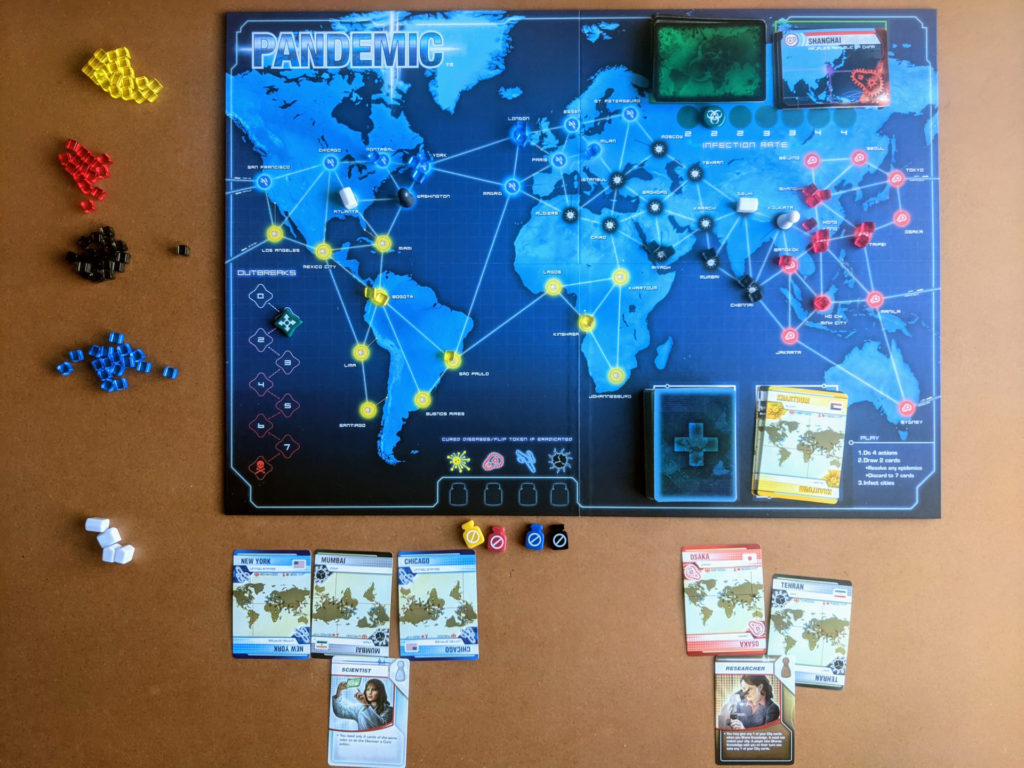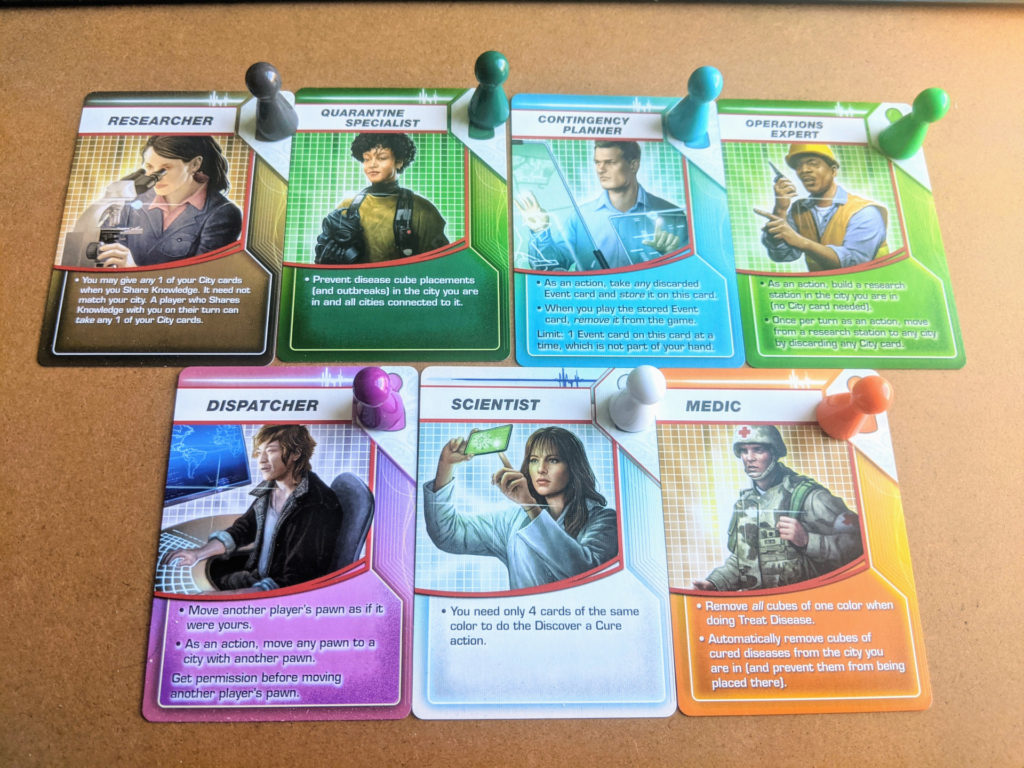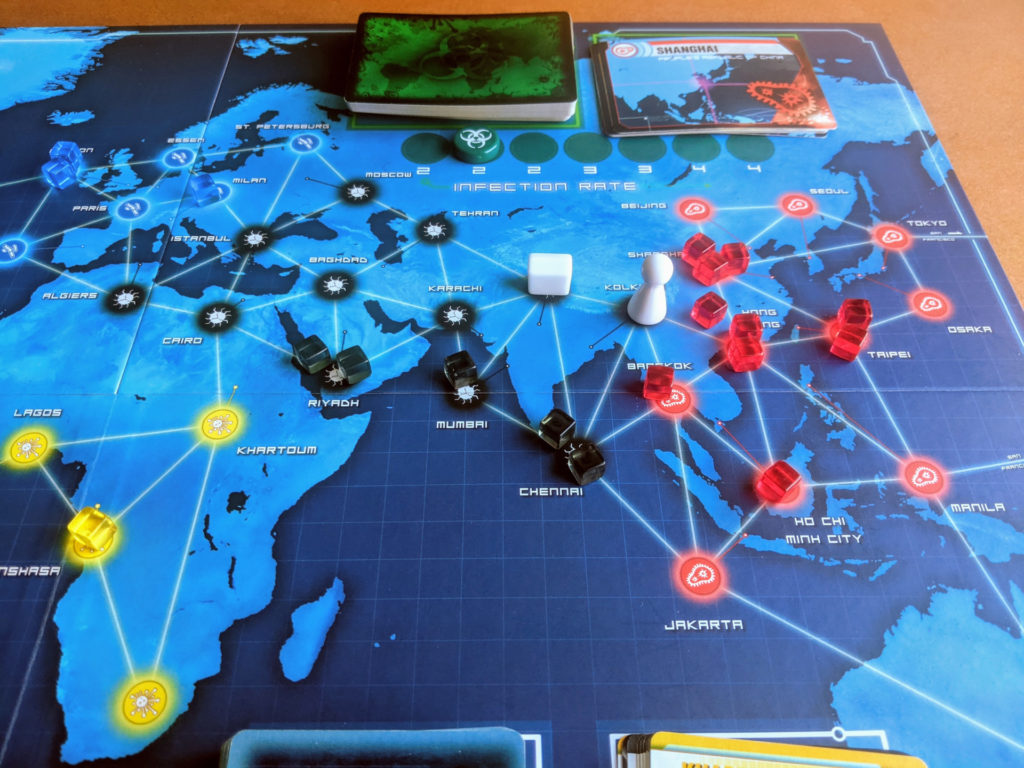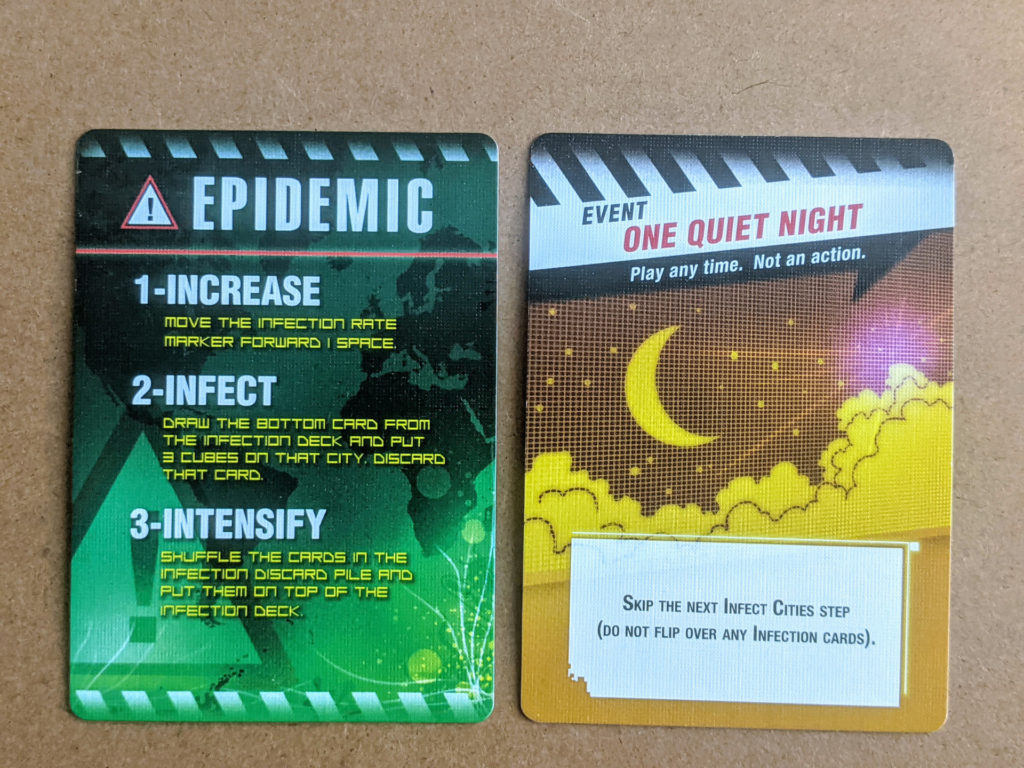“Wait wait wait wait wait! I got it!”
“Yes?”
“If you spend your Khartoum card you can fly there, pick up a cube, move one to Lagos, and build a research station.”
“Yes, and I can move, fly to the new research station, take the card from you, you being the Researcher, and get the cure.”
“And then on my turn, I can just move back and clear up these two spots.”
“Easy. All we have to do is hope I don’t draw an Epidemic.”
“We all know where this is heading, aren’t we?”
Let’s face it, if you somehow found this site, you have probably already heard of Pandemic. And for good reason, the game is a classic in board game terms, especially if we consider co-op games. Which is weird, because the game is only about a decade old. I guess that’s the advantage of a young field – you can reach the classic status faster! Is the game still relevant, and is it worth playing it, or has the industry moved on since its release? This is a surprisingly complex question, and the answer is, like with so many things: it depends. But let’s not get ahead of ourselves!
A quick recap of what’s happening in the game. You play as a member of a team consisting of 1 to 4 highly specialised anti-pandemic people in the biggest crisis humanity has ever seen: there is not one, not two, not three, but four deadly diseases, which threaten to wipe out the human race!
(By the way, it was never clear to me, are these four diseases the pandemics? Should the game be called The Four Pandemics? They are evidently different, and require different cures, so it’s not like they collectively form the titular pandemic. And it would make sense, as I recently became caught up on the terminology due to current events, a pandemic does not necessarily mean that a disease is spread across the whole globe, it can be just a large region.)

The game follows the generic co-op recipe: Every turn, the situation randomly gets worse: one of the four diseases spreads, or, in particularly unfortunate cases, an epidemic breaks out. Then, you get a chance to remedy the situation: you heal the population, move around the world map, build research centres, and ultimately, find the cure. If the diseases are deemed to be uncontrollable (there are too many cubes placed on the board, there were too many outbreaks, etc.), you lose the game. And if you manage to find the cure for all diseases, yaay, you win!
The heart of the game is the infection deck, which has one of each 48 locations. You start randomly drawing from them, but as soon as you draw an epidemic card, the cards you have already drawn gets shuffled and put on top, ensuring that you will have certain cities and regions where the problem soon becomes unmanageable.
Another interesting mechanism is the player deck, which also contains one of each of the 48 locations, but there are multiple ways to use the card. You can quickly move between cities or build research stations by discarding the corresponding cards from your hand, but you also need a set of five cards of the same colour to find the cure for a specific disease. So you have to constantly think about how to best use up your card, and try to find the optimal sequence of actions to take.
The Good
Pandemic has a superb, elegant, and simple system, the likes of which I have not yet seen replicated in any board game. It is quite astonishing how tense and close the matches can become with such a simple ruleset – you really have to experience it yourself to appreciate it. Escalation is built in the math, it’s never not exciting, every game is close, regardless of whether you lose or win. Every single turn, the expected number of cubes removed from the board is less than the expected number of new cubes placed on, and yet, you do have a chance of winning, and finding the solution is really satisfying.
It’s also an outstanding gateway game. The theme is unique and very easy to relate to (hashtag 2020) even for non-gamers, the rules are clear and simple. There’s a reason why we keep recommending Pandemic time and time again in other reviews.
The characters all bring something useful to the table (except for the contingency planner who is lame), they all have a strong advantage in one particular aspect of the game. As a result, every player feels like they have a specific task they need to do in order to win the game, and that focus really helps new players.

The game system also acts like a simple but really strong foundation, one that is easy to build on. Pandemic really lends itself for expansions, and I think it’s no coincidence that the Pandemic Legacy games are the best legacy games out there. In order to have a good legacy game, with ever expanding rules and an ongoing story, you need a perfect basic system, and very few games actually achieve that.
The Bad
The main issue with vanilla Pandemic is that all games tend to be the same. As a result, once you figure out the game, understand how to let go of your preconceptions, start counting the deck, it becomes quite predictable. I mean, it’s understandable – there are only so many different things that can happen when you randomly place cubes on a map and then try to remove them during your turn. But I can’t help feeling that the game in itself is somewhat barebone… I think a good analogy would be chess, there is a reason why it’s so universally popular, it’s simple to understand and everyone can relate to it regardless of their background, but you can also find more interesting two-player games that are closer to your individual taste, if you decide to put in the time and effort to search for them.

We also have a couple of pity complaints, one of use does not like the colour of the pawns, and the other does not like the colour of the cubes. But we will survive.
The Co-Op
So, the game is a classic, no questions about it, the first co-op board game experience for tons of people out there, so you would assume co-op is amazing. Well… Actually, there is not really a strong connection between you and the character you are playing as. There is no incentive not to play with open hands, so you see each others’ cards, and the game is simple enough for everyone to instantly see what all the options are. An alpha player can very easily overtake the whole operation here.

I have never played a game of Pandemic when we did not at some point discuss as a group what to do with all our characters in the following couple of turns, once things got a bit tense. I do enjoy those conversations a lot, but you need a group of people with similar level skills in the game in order for everyone to enjoy it.
On the other hand, the different characters are a plus, there are outright support characters in the roster, which makes co-ordinating all the more important.
So co-op is OK, but definitely not up there with the greatest, like Spirit Island.
The Recommendation
Pandemic a great co-op gateway game, fully agreed, perhaps the best one out there. But, you know, you don’t spend a lot of time in the gateway, that’s the point of it. It is supposed to lead to something else…
We absolutely recommend Pandemic for someone who considers themself a beginner in board games. I can’t imagine you not having fun with it. I personally also think that if you are a “serious” gamer, you should not skip it, because it is something you “should” know. I feel like it’s an important part of the board game encyclopedia and collective knowledge. It would be a bit like considering yourself a serious movie fan but not seeing… I don’t know, Casablanca.
However. If you are someone who is already into board games, maybe played a couple of medium difficulty ones, but that’s it, and board games are an occasional hobby for you, this game might not have much to offer. You might be better off exploring some more complicated games. Alternatively, you can get Pandemic with one of its many expansions, which make the game a bit chunkier.
Info
| Release Year | 2008 |
| Genre | Strategy |
| Difficulty | Easy |
| Number of Players | 1 to 4 |
| Length | 30 - 60 minutes |
Rating
| Overall | Great |
| Story | Great |
| Co-Operation | Good |